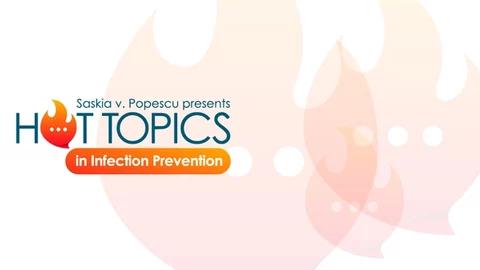Hot Topics in IPC: COVID-19 Updated Booster, Legionella Infections, and Hospital Leadership
In this Hot Topics in IPC, Saskia v. Popescu, PhD, MPH, MA, CIC, FAPIC, discusses COVID-19 vaccines and boosters, Legionella infections from transplants, and hospital leadership.
In this Hot Topics in IPC, Saskia v. Popescu, PhD, MPH, MA, CIC, FAPIC, discusses COVID-19 vaccines and boosters, Legionella infections from transplants, and hospital leadership.

New COVID-19 Vaccine Recommendations and an Updated Booster!
Good news – as we’re about to start heading into the winter months and concerns regarding a winter surge are increasing, like the cases of COVID-19 in the community, we have a new tool in the arsenal. Updated booster shots will soon be available from Moderna and Pfizer after receiving Food & Drug Administration approval. The CDC has also updated its recommendations to include “CDC recommends everyone 6 months and older get an updated COVID-19 vaccine to protect against the potentially serious outcomes of COVID-19 illness this fall and winter.” The CDC also notes that “If you have not received a COVID-19 vaccine in the past 2 months, get an updated COVID-19 vaccine to protect yourself this fall and winter.” We’ll likely see these new boosters rolled out in the next week or so, which will give us time to remind our health care workers, patients, and visitors of the importance of staying up to date and doing so now before winter hits.
Transplant-Associated Legionella Infection?
This wasn’t something I had on my 2023 Bingo card, but here we are. The CDC just released a new Morbidity and Mortality Weekly Report discussing two cases of Legionnaires disease in recipients of lung transplants from a single donor in 2022. The report does note the evaluation of such an unusual case, “The donor’s cause of death was freshwater drowning in a river, raising suspicion of potential donor-derived transmission because Legionella bacteria naturally live in fresh water. Further investigation of patients receiving other organs from the same donor did not identify additional legionellosis cases. Health care–associated infection caused by water exposure at the hospital was also evaluated as a potential source of infection and was found to be unlikely. Hospital water quality parameter measurements collected during May–June 2022 were within expected ranges, and no water disruptions were noted, although no testing for Legionella was performed during this period.”
Hospital Leadership Support is A Big Deal
Perhaps an obvious statement, but nonetheless, a new article is calling out the importance of hospital leadership support for infection prevention and control departments and programs. In this survey, the research team assessed infection preventionists’ experiences and perceptions of hospital leadership support of their programs during the COVID-19 pandemic and the relative impact on burnout. The research team noted, “64% reported very good to excellent hospital leadership support for their infection prevention and control program. However, 49% reported feeling burned out from their work. Also, [approximately] 30% responded positively [to] for all 7 psychological safety questions and were deemed to have “high psychological safety,” and 76% responded positively to the 2 safety climate questions and were deemed to have a “high safety climate.” Our results indicate an association between strong hospital leadership support and lower burnout (IRR, 0.61; 95% CI, 0.50–0.74), higher perceptions of psychological safety.” This could be a helpful article to share with your hospital leadership in that their efforts, support, and overall enthusiasm for IPC efforts truly make a difference in not only the department and program but also the individuals who are in the trenches.
Newsletter
Stay prepared and protected with Infection Control Today's newsletter, delivering essential updates, best practices, and expert insights for infection preventionists.
Reducing Hidden Risks: Why Sharps Injuries Still Go Unreported
July 18th 2025Despite being a well-known occupational hazard, sharps injuries continue to occur in health care facilities and are often underreported, underestimated, and inadequately addressed. A recent interview with sharps safety advocate Amanda Heitman, BSN, RN, CNOR, a perioperative educational consultant, reveals why change is overdue and what new tools and guidance can help.
New Study Explores Oral Vancomycin to Prevent C difficile Recurrence, But Questions Remain
July 17th 2025A new clinical trial explores the use of low-dose oral vancomycin to prevent Clostridioides difficile recurrence in high-risk patients taking antibiotics. While the data suggest a possible benefit, the findings stop short of statistical significance and raise red flags about vancomycin-resistant Enterococcus (VRE), underscoring the delicate balance between prevention and antimicrobial stewardship.
What Lies Beneath: Why Borescopes Are Essential for Verifying Surgical Instrument Cleanliness
July 16th 2025Despite their smooth, polished exteriors, surgical instruments often harbor dangerous contaminants deep inside their lumens. At the HSPA25 and APIC25 conferences, Cori L. Ofstead, MSPH, and her colleagues revealed why borescopes are an indispensable tool for sterile processing teams, offering the only reliable way to verify internal cleanliness and improve sterile processing effectiveness to prevent patient harm.
The Next Frontier in Infection Control: AI-Driven Operating Rooms
Published: July 15th 2025 | Updated: July 15th 2025Discover how AI-powered sensors, smart surveillance, and advanced analytics are revolutionizing infection prevention in the OR. Herman DeBoard, PhD, discusses how these technologies safeguard sterile fields, reduce SSIs, and help hospitals balance operational efficiency with patient safety.
Targeting Uncertainty: Why Pregnancy May Be the Best Time to Build Vaccine Confidence
July 15th 2025New national survey data reveal high uncertainty among pregnant individuals—especially first-time parents—about vaccinating their future children, underscoring the value of proactive engagement to strengthen infection prevention.